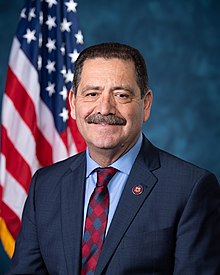Chuy García
Appearance

Jesús G. "Chuy" García (born April 12, 1956) is an American politician serving as the U.S. representative for Illinois's 4th district since 2019. A member of the Democratic Party, he served on the Cook County Board of Commissioners, Illinois Senate, as well as Chicago City Council before his election to Congress. He is a candidate for mayor of Chicago in the 2023 election, having unsuccessfully run in 2015. Throughout his career in Chicago and national politics, he has been described as a progressive.
Quotes
[edit]- To learn what makes us go, there’s no place you wouldn’t go, from the beaches of San Juan to the mountains of Mexico. And now that you’ve gone, we, the people, vow to stay strong. The unity of our coalition is a tribute to the Washington tradition. Today, today in '87, we know that you're in heaven. Adiós, amigo. Adiós.
- 1987, about Harold Washington
- We have something to say to all those big corporations and special interests who spent all those millions to install their own mayor: We want change!
- I’m running for mayor of the city of Chicago because Chicago needs to go in a different direction. For the past four years, we’ve seen Mayor Emanuel arrive in town with a boatload of money, impose his policies on the people of the city of Chicago. They favored a select few in Chicago. Through the amassing of large sums of money, he thought he could get re-elected, while leaving behind Chicago neighborhoods, making Chicago a city that leads the nation in the number of school closings—almost 50—and making Chicago, at the same time, one of the most violent cities in the country. We’ve experienced in the past four years 10,000 shootings, for example. So people in the neighborhoods feel left behind. They have come together, supported me for mayor. We’ve forced him into a runoff by building a coalition that is truly multiracial, multiethnic, across faith and across geography in Chicago. We’re fighting back against the agenda that was imposed on Chicago, and we want some attention and resources and investment in Chicago neighborhoods.
- What we’ve seen in Chicago is a policy of inequality, a lack of equity. You have some parts of the city that have really good public schools, other parts of the city that don’t have the resources that you need to have successful education occurring. Those schools happen to be located in some of the poorest neighborhoods in Chicago. And, of course, the schools that were closed in Chicago are primarily in low-income areas that are predominately African-American and Latino.
- There’s another issue in the school system, which is standardized tests. Teachers focus so much time and energy in teaching students how to pass tests that they’re not able to educate them. So our students are overtested and undereducated.
- Chicago is now at the forefront of a national debate about how you govern. Do you continue to let the powerful interests run your city, or do citizens fight back, unite and demonstrate that they can have a voice, they can chart a new course that is inclusive of the interests of all the people of Chicago?
- We have to reduce our terrible violence in many of the neighborhoods in Chicago. Ten thousand shootings over the past four years is intolerable. We need a mayor who will be about the neighborhoods, who will have the disposition, the willingness to sit with neighborhood residents, who will be receptive to the need for mental health services in many of the neighborhoods in the city of Chicago. So, a mayor who is really in tune with ordinary people, with Chicago neighborhoods and with working people in Chicago is what residents in Chicago have said they want.

